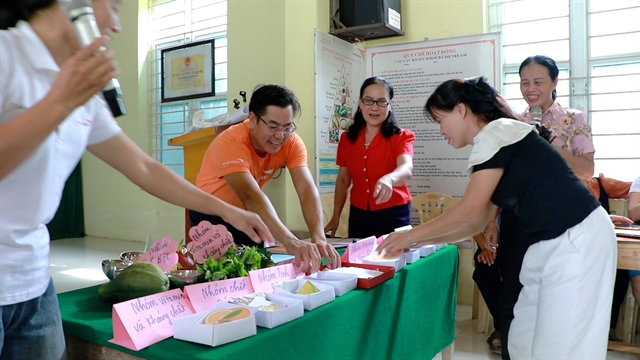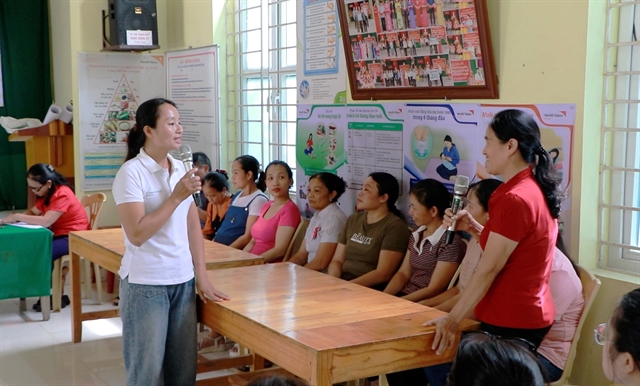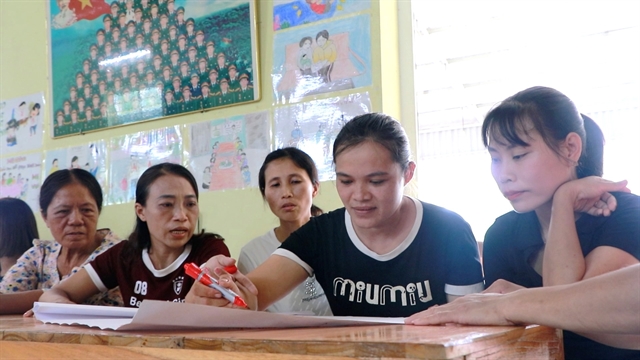 Society
Society
.jpg)
Once a month, on a Sunday evening, about 20 parents in a commune in the central province of Thanh Hóa gather to learn how to help their children get healthier.
At the local cultural centre, the primary caretakers join group discussions and knowledge-based games to learn about nutrition, reproductive healthcare and good childcare practices.
They are members of a nutrition club for caretakers of malnourished children under five years old, which is part of a development programme by the nonprofit organisation World Vision International in Việt Nam that has been running since 2007.
Forty-three-year-old Vinh, who gave only her first name, is a regular attendee at these meetings. The mother of a three-year-old said the club has helped her a lot in taking care of her child.
“When I was pregnant, I knew what I needed to eat so that my child would develop well,” she said. “After I gave birth, they helped me know when I should start introducing her to solid foods.”
 |
| Caregivers in the central province of Thanh Hóa take part in a game to learn about nutrition. VNS Photos Bảo Hoa |
Many areas in Thanh Hóa remain relatively poor, with residents making a living mainly by farming or raising cattle.
63-year-old Tốt, who also only gave his first name, and his wife are the main caretakers of their two granddaughters, since their son and his wife have moved away for work and rarely stay at home.
The grandfather said while he struggled to raise the first grandchild, joining the club helped him become more confident with the second.
“Through the meetings, we learned to feed the children foods from the main nutrient groups such as protein, fats, vitamins and minerals.”
“Since I joined the club, attended the meetings and learned about nutrients, I feel like my second grandchild has been growing faster and getting smarter than how her sister used to be,” he said.
There are 84 nutrition clubs across the province. A steering committee is made up of one leader from every club, who are trained by World Vision experts, then transfer the knowledge back to their club members.
 |
| L.T. Hải (left), board member of a nutrition club in Thanh Hóa Province, talks with club members during a meeting. |
The meetings are scheduled around the parents’ work plans to make sure most of them can attend, according to L.T. Hải, the board member of a nutrition club in Thanh Hóa Province.
“Most of our members have smartphones, so we often communicate via the Zalo messaging application,” she said.
“Previously, we often met on Sundays because they work during the week. But now some of them also work on Sunday, so we have to change our schedule and meet on Sunday evenings.”
Their commitment to learning and improving has yielded positive results. From 2018 to 2022, the prevalence of underweight in children under five years old in Hải's commune reduced from 18.8 per cent to 13.2 per cent, according to data from World Vision.
The proportion of households with sufficient safe drinking water from an improved source increased from 54.9 per cent to 80.9 per cent over the same period, and the proportion of those using improved sanitation facilities increased from 38.8 per cent to 46.8 per cent.
Dosaba Sinay, national director of World Vision International in Việt Nam, said that the organisation chose to implement the nutrition club model because of the behavioural change that would happen in the community that it is made up of.
“Caregivers can learn from each other, and feel encouraged and know that they are not alone,” he said. “These clubs are more than just a classroom. They have a safe space for love and support.”
 |
| Club members work on a group task about childcare practices. |
Experience gained from the model and other activities by World Vision has contributed to national nutrition programmes.
“Nutrition projects by World Vision have been implemented for several years now and proven to be effective, including the nutrition club and home visit models,” said Dr Huỳnh Nam Phương, head of scientific research management at the National Institute of Nutrition.
“We have used data from these projects for training materials, and also incorporated them into national target programmes.”
When the initiative finishes in 2027, World Vision aims to have improved the quality of life for nearly 11,000 children and 26,700 adults in Thường Xuân Commune, not only in terms of health and nutrition, but also child protection, sustainable livelihoods and community building. VNS